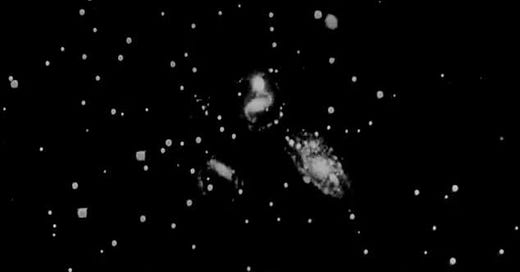What if your life is actually wonderful?
Some lessons on hope from Clarence Oddbody and his angelic friends
One of my favorite lines in any movie comes from the beginning of the 1946 classic It’s a Wonderful Life.
I watch it every Christmas Eve. My dad sang the movie’s praises for as long as I could remember before I finally sat down to watch it for the first time in college. By the end of the opening scene, it was clear I was in for a tearful night. I’ve never made it through a single viewing of Harry Bailey’s toast to his big brother without sobbing my eyes out.
In the opening scene, two senior angels—visible only as stars in the night sky—debate how to handle all the prayers coming from Earth for a man named George Bailey. It’s “his crucial night,” says one of the angels, so they call to Clarence, a lowly AS2 (Angel, Second Class) to assign him an important task.
“A man down on Earth needs our help,” says the angel.
“Splendid!” replies Clarence. “Is he sick?”
“No, worse,” answers the other. “He’s discouraged.”
The timeless wisdom of It’s a Wonderful Life can be summed up in this brief conversation. One can suffer well all manner of highs and lows, even endure the most painful losses imaginable, if one has hope. Without it, all is lost.
After the birth of my son five years ago, I suffered postpartum depression so severe it robbed me of all my hope. I was both sick and discouraged. Much like George Bailey, I could not see the value of my own life because I was blinded by the acute suffering that marked my every waking moment.
God seemed quiet in that season, but not my loved ones. No—like George’s friends and family, they prayed and prayed and prayed some more. It was only through their prayers that I felt God, and on that Christmas Eve, when I sat in the soft glow of our Christmas tree to watch It’s a Wonderful Life, the warm bodies of my children pressed against mine, the angels’ words pierced my wounded heart with the truth of how much my ordinary life still mattered.
George Bailey is so many of us. He’s the small-town, middle-aged man who had big dreams once upon a time, dreams that got pushed aside again and again by the needs of other people. George is good and decent, of course, but he’s grown into “a warped, frustrated young man” because of all he’s had to sacrifice. His wife, Mary—who serves her community with joy, remodels their drafty, old house, and raises their young children in faith and love—is George’s opposite: the person who, despite all she does not have, remains encouraged by what she does.
After Clarence saves George from a suicide attempt, he offers George “a great gift…the chance to see what the world would be like without [him].” The scales fall away and George’s bitter, discouraged heart is transformed. His life has been wonderful all along. Not because it came without suffering and hardship, but because George—whose life has touched so many others—has been loved.
You are loved.
Let me repeat that: you—no matter what you’ve accomplished, how you’ve failed, or in what circumstances you find yourself—are loved. Full stop. I can say that with confidence because you were created by a God whose very nature is Love.1 And while you might not feel loved at this moment, that doesn’t change what’s true, no more than George Bailey’s desperation to escape what seemed a hopeless situation changed how beloved he was to the people in his community.
“Each man’s life touches so many others,” Clarence tells George. “When he isn’t around he leaves an awful hole, doesn’t he?”
There is someone who thinks of you today. Maybe it’s a person you know well. Maybe it’s someone you haven’t seen in a long time. Maybe it’s a stranger who doesn’t even know your name. But out there in the world walks a person whose life has been made better because you were in it.
We may not ever get the chance to walk with an angel in an alternate reality, but every Christmas is an opportunity to think about how God so loved the world He gave us His one and only Son. Why did He do such a thing?
So that we would not perish, but have everlasting life.
When George Bailey stood on that bridge, ready to end it all, Clarence Oddbody jumped in before he could, knowing that George’s true nature would win out and he’d leap over the railing after him…not to die, but to save the old angel. This is a picture of the hope we have in the Gospel. When we stand at the edge, believing we have nothing left to live for, the God of the universe makes Himself lowly so that we might be lifted up.
A baby in a manger. A clever angel.
Unexpected answers to the prayers of the hopeless.
Tonight, I will snuggle up on the couch and turn on It’s a Wonderful Life. I’ll think of the ways my ordinary days—far removed from the outlandish dreams of my childhood—are really quite extraordinary. Like George, there have been moments when the unfulfilled dreams I carried as a teenager loom like failures. And, like Mary, there are plenty of other times when I look around—at our beautiful children, at our friends and neighbors, at all the people who love us—and feel the privilege of being alive.
“You see, George? You’ve really had a wonderful life.”
Maybe, if you take a closer look, you have, too.
1 John 4:7-12, ESV






So beautiful Wendi. I love this idea of "bringing our true nature out" -- I've never thought of how a baby in a manger could bring out the gentlest, most redemptive parts of humanity. Such a needed reminder. Merry Christmas!
😭❤️ That was beautiful. Merry Christmas to you and yours!